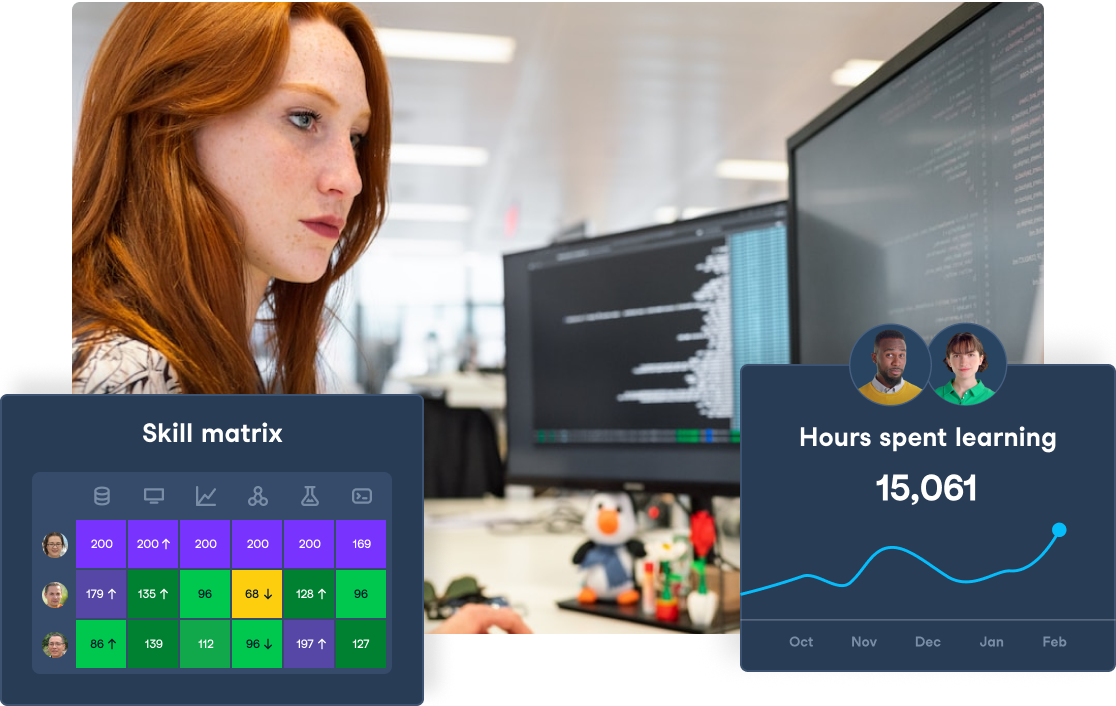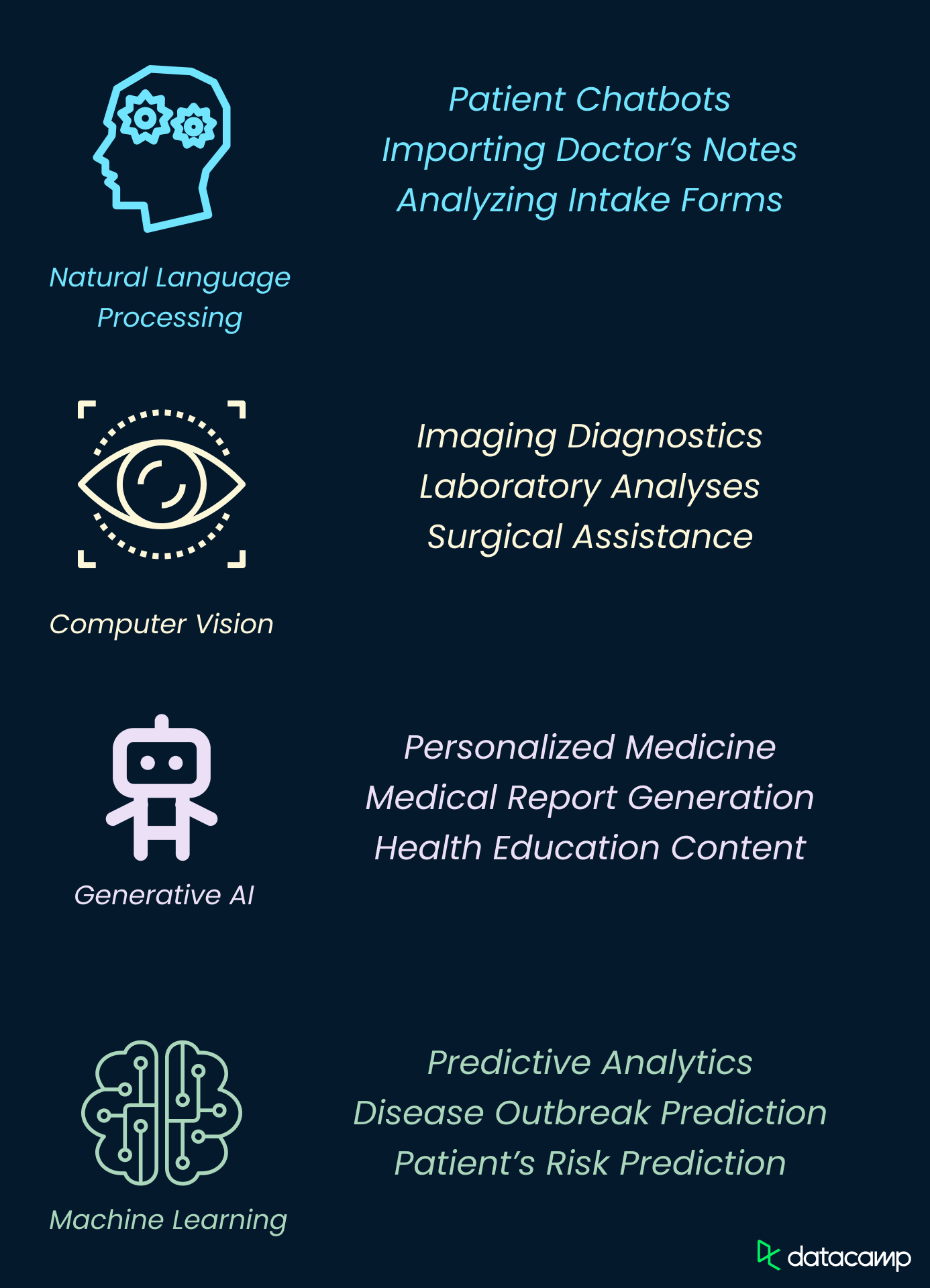Programa
AI and smart technologies have been a part of healthcare for decades. MYCIN was arguably one of the first AI systems to be incorporated into healthcare in the 1970s. It was designed to diagnose bacterial infections and recommend treatments. These and other pioneering efforts, despite their limitations, demonstrated the potential of AI to transform medical practices.
More recently, the hype around AI has been met with numerous advancements aimed at improving efficiency and accuracy across the industry, from hospitals and insurance companies to drug research and diagnostics. AI systems are being applied to interpret complex medical data, improve diagnostic accuracy, enhance patient care, and streamline operational processes.
Elevate Your Organization's AI Skills
Transform your business by empowering your teams with advanced AI skills through DataCamp for Business. Achieve better insights and efficiency.

The Benefits of AI in Healthcare
As Alex Duman, PhD, a Data Analyst at Aptive Resources, explains, AI benefits the healthcare sector in many ways:
I think some of the newer and more creative applications of AI in health care have been leveraging tools like chatbots and even generative AI to create virtual avatars to speak directly with patients and collect their history prior to a doctor's appointment. I think incorporating AI solutions to save healthcare workers time will have a major impact in streamlining visits and improving the patient's experience.
Alex Duman, Data Analyst at Aptive Resources
Enhanced diagnostics and predictive analytics
AI technology can process and interpret medical images, including X-rays, MRIs, and CT scans. Deep learning algorithms can analyze these images with high precision, identifying patterns and anomalies that might be missed by the human eye.
AI systems can also integrate clinical data to provide comprehensive diagnostics, leading to earlier detection and treatment of diseases. Diagnostic AI has applications for several domains, including radiology, pathology, and cardiology.
Personalized treatment plans
Personalized medicine is the cutting edge of healthcare and AI is making it possible. AI facilitates precision medicine by analyzing vast amounts of patient data, including genetic information, medical history, and lifestyle factors.
This analysis helps in designing personalized treatment plans that are more effective and have fewer side effects than traditional treatments. AI can also continuously learn from new data, adapting treatment recommendations to the evolving needs of each patient.
This is being utilized in situations where a personalized approach has the greatest effect on patient outcomes, like oncology and chronic disease treatment.
Operational efficiency and cost reduction
Paperwork is a significant time drain and mental load on healthcare workers. AI relieves this burden and boosts operational efficiency by automating routine administrative tasks.
This automation allows healthcare professionals to focus more on patient care. Some of the administrative tasks that AI can handle include scheduling, billing, and record management. As an example of how this works, check out Organizing Medical Transcriptions with the OpenAI API.
Predictive analytics
Predictive analytics powered by AI can forecast patient outcomes by analyzing historical data and identifying trends. This ability allows healthcare providers to intervene early to improve patient care. Predictive AI also plays a role in public health by predicting disease outbreaks and aiding in the efficient allocation of resources.
Drug discovery
AI has been accelerating the drug discovery process by analyzing vast datasets to identify potential drug candidates and predict their efficacy and safety profiles. This reduces the time and cost associated with traditional drug discovery methods.
In addition to compound screening, AI can be useful for optimizing the design and recruitment for clinical trials.
Key AI Technologies in Healthcare
There are a few specific AI technologies that are used throughout the healthcare sector. These technologies are combined in different ways and applied to problems in the industry. Let’s cover the main underlying technologies.
Machine learning
Machine learning (ML) involves the development of algorithms that can learn from and make predictions or decisions based on data. In healthcare, ML algorithms are used to identify patterns and trends in complex medical data, leading to improved diagnostics, treatment planning, and patient outcomes.
By continuously learning from new data, these algorithms have the potential to become increasingly accurate over time.
ML models have been used to predict disease progression, patient outcomes, and potential complications. They can analyze patient data to recommend personalized treatment plans and make evidence-based clinical decisions.
Natural language processing
Natural Language Processing (NLP) enables computers to understand, interpret, and generate human language. NLP is used to analyze unstructured data in medical records, research papers, and clinical notes, extracting valuable information that can improve patient care and streamline administrative processes.
NLP systems can be used to extract relevant information from Electronic Health Records (EHRs) to provide comprehensive patient summaries, assist in automating clinical documentation, or to analyze medical literature to keep healthcare professionals updated with the latest research findings.
Computer vision
Computer vision uses algorithms to process and interpret data from images. When applied to medical images such as X-rays, MRIs, and CT scans, this technology enhances diagnostic accuracy by identifying abnormalities and diseases that may be difficult to detect otherwise.
AI-powered image analysis can assist in detecting tumors, fractures, and other conditions. They can analyze pathology slides to identify cancerous cells or provide detailed visualizations to aid surgeons in planning complex procedures.
With DataCamp Business for Healthcare, your employees can learn about these technologies and how to use them to improve patient outcomes.

The Uses of AI in Healthcare
How AI is Used in Healthcare
These AI technologies are used in different combinations to solve problems across the healthcare sector. You can read about AI use in hospitals in Python in Healthcare: AI Applications in Hospitals.
Here are a few ways AI is being applied to healthcare.
Medical imaging and diagnostics
As Arnaub Chatterjee, a Senior Expert/Associate Partner in the Pharmaceutical and Medical Products group at McKinsey and Company, explains,
I think what we're seeing now is a consensus from a number of parties, whether it's hospitals and technology companies, is that AI is going to transform the diagnostic imaging industry, whether it's enhanced productivity, whether it's improved accuracy, personalized treatment planning, all of these functions are up for grabs.
Arnaub Chatterjee, Senior Expert/Associate Partner in the Pharmaceutical and Medical Products group at McKinsey and Company
AI has revolutionized medical imaging and diagnostics by providing tools that enhance the accuracy and efficiency of disease detection. You can learn more about this in the Biomedical Image Analysis in Python course from DataCamp.
Radiology
AI algorithms are being used to analyze X-rays, CT scans, and MRIs to identify conditions such as tumors, fractures, and infections with high precision. For example, AI systems can detect lung nodules in chest X-rays earlier than traditional methods.
Pathology
AI assists pathologists by analyzing tissue samples to identify cancerous cells and other abnormalities. Digital pathology platforms use AI to scan and interpret slides, speeding up the diagnostic process and reducing human error.
Cardiology
AI can be used in conjunction with cardiologists to identify patients at higher risk for heart problems. The Mayo Clinic is using AI for early detection of cardiovascular conditions, such as stroke, and to prevent heart failure.
Ophthalmology
AI systems analyze retinal images to detect diabetic retinopathy, glaucoma, and age-related macular degeneration, providing early diagnosis and treatment options. Google Health is using AI to diagnose diabetic retinopathy and reduce blindness.
Dermatology
AI-powered image analysis helps in identifying skin conditions such as melanoma by examining digital photographs of skin lesions. Novartis and Microsoft have paired up to design an AI-powered digital health tool to identify leprosy from images of skin lesions.
Remote monitoring and telehealth
AI enables remote patient monitoring and telehealth services, providing continuous care and reducing the need for in-person visits. Wearable devices and sensors collect real-time health data like heart rate, blood pressure, and glucose levels. AI algorithms can analyze this data to detect anomalies and alert healthcare providers to potential issues before they become critical.
Virtual consultations
AI-powered chatbots and virtual assistants help with initial patient assessments and triage in order to direct patients to appropriate care. Telehealth platforms use AI to enhance video consultations by providing real-time insights and diagnostic support for healthcare providers.
Drug discovery and development
AI plays a crucial role in expediting the drug discovery and development process, reducing the time and costs associated with bringing new treatments to market.
Compound screening
AI algorithms can analyze vast chemical libraries to identify potential drug candidates with the highest likelihood of success. This accelerates the initial screening phase, allowing researchers to focus on the most promising compounds. Pfizer uses AI to accelerate the drug discovery process.
Clinical trials
AI can optimize the design and execution of clinical trials by identifying suitable candidates, predicting patient responses, and monitoring data in real time. This leads to more efficient trials and faster approval of new drugs.
Predictive modeling
AI models can predict how new drugs will interact with biological systems, helping researchers anticipate side effects and efficacy. This helps improve the safety and effectiveness of new treatments. Cleveland Clinic is using AI to predict epilepsy patients’ response to surgery.
Public health initiatives
AI supports public health efforts by providing tools for disease monitoring, outbreak prediction, and prevention strategies.
Epidemiology
AI can be used to analyze data from various sources, such as healthcare records and travel patterns, to predict disease outbreaks and track the spread of infectious diseases. This enables public health officials to respond more effectively and allocate resources where they are needed the most.
Preventive programs
AI-driven predictive analytics identify populations at risk for certain diseases, allowing for targeted preventive measures and health interventions. For example, AI can predict flu outbreaks based on historical data and environmental factors, which can guide vaccination campaigns.
Operations
AI is increasingly being used to improve healthcare operations efficiency, from scheduling to inventory and more. Humana used conversational AI from IBM to quickly and efficiently handle inquiries from healthcare providers about patient insurance coverage.
AI Tools
Below is a table of several AI tools currently being used across the healthcare sector.
|
Tool |
Used For |
Used By |
|
Facilitating early disease detection and minimizing diagnostic errors |
Hospitals |
|
|
Streamlining claims processing and fraud detection |
Insurance Companies |
|
|
Identifying potential drug candidates and predicting their efficacy |
Drug Development |
|
|
Decreasing the time and expense associated with bringing new treatments to market |
Drug Development |
|
|
Accurately detecting conditions such as diabetic retinopathy and skin cancer from medical images |
Diagnostics |
|
|
Achieving results comparable to those of seasoned clinicians in diagnostics |
Diagnostics |
|
|
Enhancing operational efficiency using AI-powered predictive analytics |
Healthcare Facilities |
|
|
Optimizing resource allocation and reducing operational costs |
Healthcare Facilities |
Challenges of AI in Healthcare
While AI holds great promise, it also presents several challenges.
When it comes to AI use in healthcare, ethical concerns are paramount! Issues such as AI bias, accountability, and the potential for misuse raise important ethical questions. Practicing ethical AI is important for maintaining trust and fairness in healthcare applications. The WHO issued a report in 2021 outlining ethical standards for AI use in healthcare. The report outlines six guiding principles to maximize AI's benefits and minimize its risks, ensuring it serves the public interest and is inclusive, transparent, and accountable. These standards are geared to maintain patients’ agency regarding their own care and ensure patient privacy and fairness, ultimately keeping humans in control.
Data privacy is a significant challenge. The use of AI requires access to large amounts of patient data, which raises concerns about data security and patient privacy. Robust data protection measures are essential to safeguard sensitive information.
The rapid advancement of AI technology is also outpacing the creation of new regulations. This “wild west of AI” can be dangerous if not treated carefully. We need to develop and follow robust regulatory frameworks to ensure the safe and effective use of AI in healthcare.
Evaluating the cost and return on investment (ROI) of implementing AI solutions is another factor. Developing and deploying AI solutions can be expensive, requiring significant investment in technology, infrastructure, and training. While AI can lead to cost savings and efficiency gains, the initial investment and ongoing maintenance costs must be carefully considered.
Addressing AI Bias in Healthcare
Perhaps the biggest challenge of AI in healthcare is AI bias.
Understanding AI bias
AI algorithms, if not properly designed and tested, can inherit biases present in the data they are trained on. These biases can lead to unequal and unfair treatment of different patient groups, potentially exacerbating existing health disparities.
Training data may reflect existing societal biases, such as racial, gender, or socioeconomic disparities, leading to biased AI models. For example, an AI model trained primarily on data from one demographic may perform poorly on others.
Algorithmic bias can also arise during the design and development of AI models, especially if diverse perspectives are not considered in the development process.
AI bias is a very important issue to address. The impact of biased AI algorithms on healthcare outcomes can be severe, resulting in misdiagnosis, unequal treatment recommendations, and poor health outcomes for marginalized groups. This not only undermines trust in AI systems but also diminishes the overall quality of care.
Mitigation strategies
To address and mitigate AI bias in healthcare, we need to do a few things.
First, we need to ensure that training datasets are diverse and representative of all patient populations. This will help to minimize bias and improve the generalizability of AI models.
Second, we need to regularly conduct bias audits and use fairness metrics to evaluate the performance of models across different demographic groups to help identify and measure biases.
Maintaining transparency in the development and deployment of AI models can help ensure accountability. And inclusive design teams, involving diverse perspectives, can help prevent biases and improve the overall fairness of the models.
Finally, continuously monitoring AI systems in real-world settings to detect and address any emerging biases is essential! If bias is detected, we can begin implementing feedback loops to refine and improve models over time.
The Future of AI in Healthcare
Let’s now consider what the future may look like as AI in healthcare becomes more prevalent. Adam Baker, CEO at Perspectives Behavioral Health Management LLC, suggests that,
In the future, AI will likely be even more embedded in healthcare. It will provide real-time support, advanced diagnostics, and highly personalized treatment recommendations. With AI, healthcare can become more proactive, continuously monitoring and predicting health issues before they escalate, leading to a more responsive and efficient system.
Adam Baker, CEO at Perspectives Behavioral Health Management LLC
Emerging trends
Let’s first look at some of the recent AI trends that we’re seeing in the healthcare industry:
AI in genomics
AI is transforming genomics by enabling the analysis of vast amounts of genetic data quickly and accurately. This will improve the identification of genetic mutations, our understanding of complex genetic disorders, and the development of personalized treatment plans based on an individual’s genetic makeup.
Telemedicine and AI
AI is enhancing telemedicine by providing tools for remote patient monitoring, virtual consultations, and continuous health assessment. AI-powered chatbots and virtual assistants facilitate patient interactions, providing initial assessments and directing patients to appropriate care.
AI can analyze data from wearable devices to monitor patients’ health in real time, alerting healthcare providers to potential issues before they become critical.
AI and mental health
AI is being used to improve the diagnosis and treatment of mental health conditions by analyzing data from various sources, including speech patterns, social media activity, and biometric data. There’s even speculation that AI psychiatrists could become common.
AI models may be able to identify early signs of mental health issues such as depression and anxiety, enabling timely interventions. AI can provide personalized treatment recommendations based on individual patient data, improving the effectiveness of mental health interventions.
AI in elder care
Smart technologies monitor the health and safety of elderly individuals at home, alerting caregivers to potential issues. AI-powered robots can also assist with daily tasks, mobility, and medication management, improving the quality of life for the elderly.
Economic impact
AI is expected to have a profound economic impact on the healthcare industry, driving growth and creating significant financial benefits. The market is projected to reach $188 billion by 2030. This is expected to be largely driven by advancements in AI technology and increased AI adoption by healthcare organizations.
AI can also reduce healthcare costs by improving operational efficiency, automating administrative tasks, and enhancing diagnostic accuracy. This should lead to fewer errors and better resource utilization. For example, at the Cleveland Clinic, AI-powered scheduling tools led to a 10% reduction in wait times for patients. This type of efficiency frees up healthcare professionals to focus on more complex and value-added tasks, increasing overall productivity and patient care.
AI in Healthcare Training and Development
As we’ve seen, AI in healthcare seems like an inevitability at this point, and as such, it’s crucial that those in the healthcare industry are adequately prepared for the new technologies and processes that are to come.
Training programs enhanced by AI
AI has the potential to revolutionize the way healthcare organizations design and implement training programs. Adaptive learning platforms powered by AI can provide personalized learning experiences, adapting content and pace to individual learner needs.
Personalized learning
An example of this personalized learning approach is DataCamp’s AI assistant, which offers personalized feedback, and it’s adaptive assessments, which tailor learning to meet the student’s skill level.
This tailored educational approach can improve the retention of complex information. These personalized training programs can be used for learning new medical procedures, new administrative technologies, or to keep on top of the latest research.
Cutting-edge training methods
For example, simulation and virtual reality (VR) technologies, driven by AI, can offer hands-on training for complex medical procedures. These AI-driven simulations can create immersive learning environments that enhance practical skills without any risk to patients.
These technologies are already in use. For example, Cleveland Clinic uses interactive, AI-powered healthcare learning courses for continuous learning for their healthcare professionals. Their goal is to become the most AI-literate healthcare system in the word!
AI tools can also be used to track improvements in employee performance, patient outcomes, and operational efficiency as a result of continuous learning. Feedback systems, powered by AI, can collect and analyze feedback from learners to refine and enhance those training programs.
Upskilling in AI
As Al services become more commonplace in healthcare, it is increasingly important that users of this software are familiar with its promise as well as its limitations. Al literacy is now as important as internet literacy was in the '90s and early 2000s. According to The State of Data & AI Literacy 2024 report,
“62% of leaders believe AI literacy is now important for their teams’ day-to-day tasks”.
DataCamp For Business has some great resources for upskilling your workforce in Al, like this Responsible AI Practices course. DataCamp also offers customized learning paths for employees at your organization, so they can quickly learn the Al skills that is are to them.
By leveraging the benefits of AI in training and development, healthcare organizations can ensure their workforce remains competent, up-to-date, and ready to meet the demands of modern healthcare.
Elevate Your Organization's AI Skills
Transform your business by empowering your teams with advanced AI skills through DataCamp for Business. Achieve better insights and efficiency.

Conclusion
AI offers transformative benefits for the healthcare industry, including improved patient outcomes, enhanced operational efficiency, personalized care, and robust training and development opportunities.
Business leaders are embracing AI as a strategic priority. Listen to AI in Healthcare, an Insider’s Account or Using AI to Improve Data Quality in Healthcare to hear how healthcare leaders are thinking about AI.
For a high-level view of what AI is and how it’s changing things, check out this Introduction to Artificial Intelligence theoretical course. Or check out this webinar on AI in Healthcare: What the Slope of Enlightenment Will Look Like.

I am a PhD with 13 years of experience working with data in a biological research environment. I create software in several programming languages including Python, MATLAB, and R. I am passionate about sharing my love of learning with the world.

